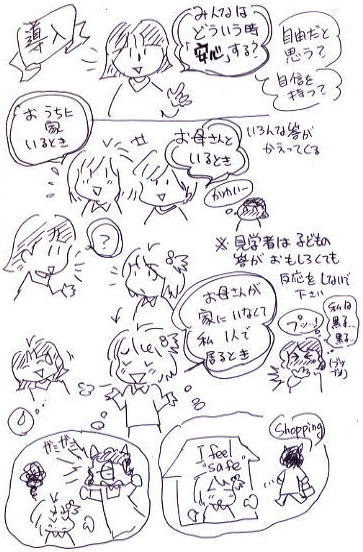
What is the CAP ProjectH
CAP is an acronym meaning "Child Assault Prevention."
The CAP Program shows how to protect and empower children from assault--mental, physical and sexual.
The CAP Project began in Columbus, Ohio (USA)
in 1978.
Rape prevention activities for women were
being held at the "WAR (Women Against
Rape)
Rape Instruction Center" there.
1985--Introduced to Japan by Yuri Morita who was tha Training
at that time as the Coordinator of the CAP
Training Center of California.
1995 November-- "CAP Specialist-Training"
began and many
CAP groups developed in Japan.
1999 December (present)--About 100 CAP groups
( NPO ) are active in Japan, 70
of which are registered groups with CAP Center
Japan.
Believes in empowerment.
@We recognize that children have wonderful
inherent qualities.
@Empowerment means drawing out the inner
strength.
Children are not weak things that need protection--they
must be empowered.
Key word of b`o
SAFE ΐS@@STRONG ©M@@FREE©R
NO! ’β@GO! Ι°ι@TELL b·
EMPOWMENT=(Gp[gj
CAP WORK SHOP for children
(1+2+3=1hour)
( Sorry,I use pics with Japanese)
@@Trained workshop leaders also provide
prevention information as well as crisis
intervention to children
who identify themselves as victims of assault
or neglect.

 |
1 ABOUT SAFE STRONG FREE WHEN ARE YOU IN SAFETY? I am in safety when Iam with mother I am in safety when I am in house without mother |
2
Provides children with practical skills
while building confidence in their own abilities
to solve problems through a wide range of
role-playing settings@




Children don't have safety

we aim to give children the skills to recognize,
avoid, and handle abusive situations.
More specifically, children learn how to
stand up to bullies, distinguish between
safe
and unsafe touches, and understand that abuse
is never their fault.





two staff members or volunteers present a series of age-appropriate role-plays to children in individual classes. Together with workshop leaders, children develop strategies to address each situation addressed in the role-plays. Strategies include assertiveness skills (saying "no" in a strong voice or telling a bully "stop it, I donft like that,") and telling a trusted adult about the experience. Upon determination of the most effective strategy for each situation, the role-plays are presented "successfully" in order for the appropriate behavior to be modeled to the children.
3EMPOWMENT

Provides multiple choices from which the
children can choose.
SAY "NO!" @@RUN AWAY!@ @TELL
SOMEONE..


Implemented in 12 countries,
@CAP countries include: USA, Canada, Costa
Rica, England, Germany, Grand Bahamas, Ireland,
Moldova,
@Holland, New Zealand and France@@@@@@@@@@
When the community people are able to prevent child assault themselves, the CAP Program will expand on its own accord.
Rinks
YWCA Rape Crisis Center
NNCC Child Assault Prevention Project
Child Abuse and Neglect Clearinghouse Home Page